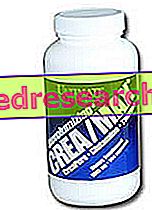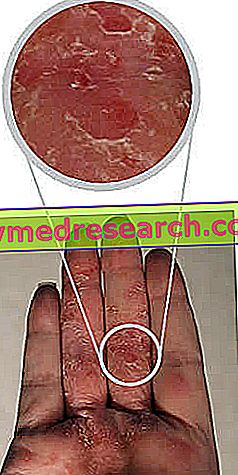
About Crea Max - Ultimate Nutrition
CREA / MAX - ULTIMATE NUTRITION
Food supplement based on creatine, glutamine and taurine.
FORMAT
Pack of 144 capsules
COMPOSITION
Creatine monohydrate
L-glutamine
L-Taurine
Capsule: edible gelatin
Anti-caking agent: magnesium stearate
FOR CAPSULE: Energy: Kcal 3 - Creatine monohydrate 333mg - L-glutamine 333mg - L-Taurine 333 mg
Creatine monohydrate - the most studied and characterized form, it has more than 200 publications on its effectiveness in sports and almost 2 decades of continuous use. Creatine monohydrate taken orally is absorbed in the intestine, registering a plasma peak 90 'after ingestion (for amounts below 10 grams). Through the circulatory stream, it reaches the muscular level, where through a cotransport with sodium, enhanced by the insulin action, it penetrates to sarcoplasmic level. Here it is partly phosphorylated by creatine kinase in phosphocreatine, a key molecule in muscle energy metabolism. During the first minute of intense physical exercise, phosphocreatine can transfer its phosphoric group to ADP, allowing the synthesis of ATP and supporting muscle contraction. During this process, part of the available phosphocreatine undergoes non-enzymatic hydrolysis, with the consequent production of its inactive metabolite: creatinine. This is totally eliminated through the kidneys, for about 2 grams per day: a portion that is partially recovered through endogenous synthesis, supported by amino acids such as arginine, glycine and methionine, partly through dietary intake (especially through the meats). The pro energetic muscle role makes this product one of the most used and most effective supplements for sports practice. The benefits demonstrated by its use are reflected in:
- Improvement in strength and maximum power;
- Improvement of the sub-maximal force;
- Improvement of aerobic performance;
- Reduction of muscle fatigue;
- Improvement of body composition;
and probably also on the athlete's aerobic capacity and on the protection of muscle tissue.
L-Taurine - molecule synthesized in the liver from sulfur amino acids such as methionine and cysteine, in the presence of vitamin B6. Commonly defined as a conditionally essential amino acid, it differs structurally and functionally from the other amino acids due to the absence of the carboxyl group, and to the lack of plastic and reconstructive capacity. Although it does not fall within the processes of protein synthesis, taurine is found - in addition to the constitution of the bile salts necessary for the correct digestion and absorption of lipids - also at the cardiac and muscular level, where it regulates cellular hydrosalinic homeostasis and protects the tissues from oxidative insult. It also includes the stabilization of cell membranes and the regulation of immune activity.
The daily requirement of taurine is generally satisfied both by the 400 mg synthesized endogenously, and by the quota taken through the diet, in particular with foods of animal origin.
The numerous potentialities of this molecule have led various researchers to experiment its use in various pathological conditions, proving to be effective in protecting the body from cardiovascular risk, in improving the lipidemic profile, in assisting in the treatment of some neuronal and metabolic pathologies; despite this, a definite therapeutic field of application is still lacking.
In the sports field, taurine has found application in synergy with other energizing substances, such as caffeine and guarana, in supporting athletic and cognitive performance.
However, taurine is also used for purposes other than energizing, such as trying to counteract the damage induced by intense physical activity, reducing markers of oxidative damage and preserving the integrity of the muscle structure.
L-Glutamine - produced predominantly in the muscles, represents the most abundant plasma amino acid. Its importance in balancing the organic functions is essentially due to the function of carrier of amino groups, necessary to guarantee the correct detoxification from ammonia, and the relative disposal in the form of urea. As a transporter of amino groups, glutamine is also very important in anabolic processes, making amino groups available for protein synthesis processes based on tissue needs. In addition to the detoxifying role, glutamine is also fundamental for:
- Anabolic role, falling within the processes of protein synthesis like all other amino acids;
- Energy role: as a precursor of glutamate and alfachetoglutarate it is included in both the krebs cycle and in the gluconeogenic process;
- Modulatory role of the cell cycle: it represents one of the main energy sources for cells in active proliferation, such as those of the intestinal mucosa, and like the immune ones;
- Excitatory role: crossing the blood-brain barrier, it reaches the neuronal level, where it is converted into glutamate, a neurotransmitter with an excitatory function;
- Antioxidant role: provides the glutamate used in the synthesis of glutathione.
Although glutamine is generally considered a NON-essential amino acid, there are some conditions, mostly pathological, which definitely increase the demand for this amino acid, requiring a specific integration. Burns, severe trauma, chronic and infectious diseases, and cancer are just some of the above conditions, for which, however, a glutamine-based treatment protocol has not yet been standardized, given the somewhat contrasting results. In addition to the aforementioned pathological conditions, there is another situation in which the demand for glutamine becomes more intense: physical exercise. Amino acid oxidation, which occurs above all in endurance sports, induces a significant increase in nitrogen compounds, with the consequent activation of all those detoxification systems necessary to protect the body from ammonia toxicity. Glutamine is one of the most committed systems, whose prolonged decline will be accompanied by a syndrome known as overtraining syndrome, characterized by immune deficiency, asthenia, chronic fatigue and recurrent infections. Therefore, glutamine supplementation in sports practice is part of the overtraining prevention processes, and potentially improvements in detoxification systems.
Product Features Create Max - Ultimate Nutrition
The particular formulation of this product is born with the intent to balance the muscular functions. Creatine and glutamine, in fact, should support - as also documented by some scientific works - the increase in maximum strength and the improvement of body composition, while taurine should protect the muscle from the oxidative insult induced by intense physical exercise, which inevitably affects the contractile and functional muscle capacities.
In support of these hypotheses there is only one study, which shows how supplementation with 0.3 g of creatine per kg of body weight for the first week, followed by 0.03 g / kg for the following 7 weeks, concurrently with 4 g / day of glutamine, guaranteed an increase in lean mass and strength compared to the group supplemented with creatine alone.Recommended use by the company - Create Max - Ultimate Nutrition
It is recommended to take 1 capsule a day.
How to use in sports Do Create Max - Ultimate Nutrition
Also in this case it is very difficult to suggest an effective dosage, given the small amount of scientific work. Furthermore, it is necessary to consider that in the capsule the three elements are shared equally, therefore it would be necessary to find the correct compromise between all the active ingredients in question.
The 2 grams per day per single item, which require 6 capsules / day, seem to be the best compromise between the three products, without having to resort to other supplements.
It would be preferable to take the intake before training, with a source of simple sugars (and for example with some fruit juice) so as to facilitate the uptake of creatine and glutamine.
Side Effects Create Max - Ultimate Nutrition
Several studies agree that creatine supplementation is safe in healthy individuals. In particular, studies relating to chronic supplementation (3-5 g / day for one year) and acute (20 g / day for a week) do not show any particular side effects.
However, it should be remembered that ingesting too high or poorly solubilized doses could be accompanied by abdominal cramps, nausea, vomiting and diarrhea, as well as chronic doses, especially if performed concomitantly with high-protein diets could significantly increase renal load.
Finally, even if it does not represent a real side effect, it must be considered that the increase in weight that derives from the accumulation of water inside the cell, could have a negative impact on performance.
Taurine: Not yet well documented are the side effects of this substance, which seems to be safe at a dose of 3 grams per day.
However, cases of hypertension are documented
Nausea, vomiting, fatigue, and migraine were found at high doses.
Glutamine: several studies have experimented supplementation with doses of oral glutamine even in excess of 20 grams, without registering any particular side effect.
A single long-term study, with athletes taking daily doses of 28 grams for 2 weeks, distributed in 4 different assumptions, showed no side effects.
Precautions for use Create Max - Ultimate Nutrition
The product is contraindicated in cases of renal or hepatic disease, cardiovascular disease and / or hypertension, in pregnancy, during lactation and under 12 years and adolescents not yet trained.
In the event of prolonged use (over 6/8 weeks), medical advice is required.
This article, elaborated on the critical re-reading of scientific articles, university texts and common practice, is for informational purposes only and is therefore not a medical prescription. It is therefore always necessary to consult your doctor, nutritionist or pharmacist before starting to use any kind of supplement . Learn more about the critical analysis of Crea Max - Ultimate Nutrition.
BIBLIOGRAPHY
The effects of 8 weeks of creatine monohydrate and glutamine supplementation on body composition and performance measures.
Lehmkuhl M, Malone M, Justice B, Trone G, Pistils E, Vinci D, Haff EE, Kilgore JL, Haff GG.
J Strength Cond Res. 2003 Aug; 17 (3): 425-38.
Int J Sport Nutr Exerc Metab. 2006 Aug; 16 (4): 430-46.
Effect of creatine and beta-alanine supplementation on performance and endocrine responses in strength / power athletes.Hoffman J, Ratamess N, Kang J, Mangine G, Faigenbaum A, Stout J.
Rejuvenation Res. 2008 Jun; 11 (3): 641-7.
Creatine supplementation augments skeletal muscle carnosine content in senescence-accelerated mice (SAMP8).Derave W, Jones G, Hespel P, Harris RC.
J Int Soc Sports Nutr. 2009 Feb 19; 6: 6.
Spillane M, Schoch R, Cooke M, Harvey T, Greenwood M, Kreider R, Willoughby DS.
//www.sportmedicina.com/creatina.htm
Ergogenic effects of creatine in sports and rehabilitation.
Hespel P, Derave W.
Subcell Biochem. 2007; 46: 245-59. Review.
J Nutr Health Aging. 2010; 14 (2): 155-9.
The effects of supplementation with creatine and protein on muscle strength following a traditional resistance training program in middle-aged and older men.
Bemben MG, Witten MS, Carter JM, Eliot KA, Knehans AW, Bemben DA.
J Int Soc Sports Nutr. 2009 Nov 12; 6: 18.
Graef JL, Smith AE, Kendall KL, Fukuda DH, Moon JR, Beck TW, Cramer JT, Stout JR.
Med Sci Sports Exerc. 2009 Sep 2. [Epub ahead of print]
Effect of Short-Term Creatine Supplementation on Neuromuscular Function.Bazzucchi I, Felici F, Sacchetti M.
Effects of four weeks of high-intensity interval training and supplementation on critical power and anaerobic working capacity in college-aged men.
Kendall KL, Smith AE, Graef JL, Fukuda DH, Moon JR, Beck TW, Cramer JT, Stout JR.
J Strength Cond Res. 2009 Sep; 23 (6): 1663-9.
Creatine supplementation enhances muscle force recovery after eccentrically-induced muscle damage in healthy individuals.
Cooke MB, Rybalka E, Williams AD, Cribb PJ, Hayes A.
J Int Soc Sports Nutr. 2009 Jun 2; 6: 13.
Int J Sport Nutr Exerc Metab. 2009 Feb; 19 (1): 79-96.
Conjugated linoleic acid combined with creatine monohydrate and whey protein supplementation during strength training.Cornish SM, Candow DG, Jantz NT, Chilibeck PD, Little JP, Forbes S, Abeysekara S, Zello GA.
J Strength Cond Res. 2009 May; 23 (3): 818-26.
Effects of creatine monohydrate and polyethylene glycosylated creatine supplementation on muscular strength, endurance, and power output.Herda TJ, Beck TW, Ryan ED, Smith AE, Walter AA, Hartman MJ, Stout JR, Cramer JT.
Effects of creatine monohydrate and polyethylene glycosylated creatine supplementation on muscular strength, endurance, and power output.Herda TJ, Beck TW, Ryan ED, Smith AE, Walter AA, Hartman MJ, Stout JR, Cramer JT.
Int J Sport Nutr Exerc Metab. 2008 Aug; 18 (4): 389-98.
Burke DG, Candow DG, Chilibeck PD, MacNeil LG, Roy BD, Tarnopolsky MA, Ziegenfuss T.
Physiol Behav. 2008 Sep 3; 95 (1-2): 130-4. Epub 2008 May 15.
Creatine supplementation does not improve cognitive function in young adults.Rawson ES, Lieberman HR, Walsh TM, Zuber SM, Harhart JM, Matthews TC.
J Int Soc Sports Nutr. 2006 Jun 23; 3: 60-6.
Regulation and expression of creatine transporter: a brief review of creatine supplementation in humans and animals.Schoch RD, Willoughby D, Greenwood M.
//www.ncbi.nlm.nih.gov/pmc/articles/PMC2129152/?tool=pubmed
J Int Soc Sports Nutr. 2008 Feb 13; 5: 4.
The effects of creatine pyruvate and creatine citrate on performance during high intensity exercise.Jäger R, Metzger J, Lautmann K, Shushakov V, Purpura M, Geiss KR, Maassen N.
Creatine supplementation does not reduce muscle damage or enhance recovery from resistance exercise.
Rawson ES, Conti MP, Miles MP.
J Strength Cond Res. 2007 Nov; 21 (4): 1208-13.
J Nutr Health Aging. 2007 Nov-Dec; 11 (6): 459-64.
Effects of creatine supplementation on the onset of neuromuscular fatigue threshold and muscle strength in elderly men and women (64 - 86 years).Stout JR, Sue Graves B, Cramer JT, Goldstein ER, Costa PB, Smith AE, Walter AA.
Appl Physiol Nutr Metab. 2007 Dec; 32 (6): 1052-7.
Effect of in-season creatine supplementation on body composition and performance in rugby union football players.Chilibeck PD, Magnus C, Anderson M.
Clin Sci (Lond). 1992 Sep; 83 (3): 367-74.
Elevation of creatine in resting and exercised muscle of normal subjects by creatine supplementation.Harris RC, Söderlund K, Hultman E.
Br J Sports Med. 1996 Sep; 30 (3): 222-5.
Effect of creatine on aerobic and anaerobic metabolism in skeletal muscle in swimmers.Thompson CH, Kemp GJ, Sanderson AL, Dixon RM, Styles P, Taylor DJ, Radda GK.
J Appl Physiol. 1996 Jul; 81 (1): 232-7.
Muscle creatine loading in men.Hultman E, Söderlund K, Timmons JA, Cederblad G, Greenhaff PL.
Int J Sport Nutr. 1995 Jun; 5 (2): 94-101.
Creatine supplementation and exercise performance.Maughan RJ.
Med Sci Sports Exerc. 1998 Jan; 30 (1): 73-82.
Effects of creatine supplementation on body composition, strength, and sprint performance.Kreider RB, Ferreira M, Wilson M, Grindstaff P, Plisk S, Reinardy J, Cantler E, Almada AL.
Subcell Biochem. 2007; 46: 275-89.
Safety of creatine supplementation.Persky AM, Rawson ES.
Int J Sports Physiol Perform. 2006 Dec; 1 (4): 311-23.
Side effects of creatine supplementation in athletes.Francaux M, Poortmans JR.
Regul Toxicol Pharmacol. 2006 Aug; 45 (3): 242-51. Epub 2006 Jun 30.
Risk assessment for creatine monohydrate.Shao A, Hathcock JN.
Am J Physiol. 1996 Nov; 271 (5 Pt 1): E821-6.
Carbohydrate ingestion augments skeletal muscle creatine accumulation during creatine supplementation in humans.Green AL, Hultman E, Macdonald IA, Sewell DA, Greenhaff PL.



